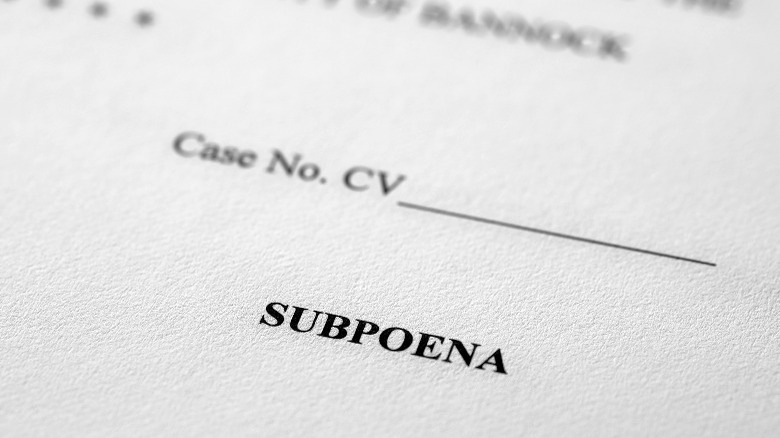Living In A Post-Roe V. Wade World: Can Your Period Tracker App Data Be Used Against You? - Exclusive
With highly restrictive or outright prohibitive abortion laws ripping through the United States, women continue to navigate life after Roe v. Wade was overturned. The law, after decades in the making, once protected abortion as a constitutional right. In both the lead-up to and aftermath of the overturning of the law, experts warned that period tracker apps could be used to prosecute women seeking abortion care in states with strict abortion laws. Women were encouraged all across social media to delete their period tracker apps out of concern they would be tracking personal data.
But, the loss of Roe v. Wade entails consequences far beyond law enforcement seizing data on your app. Women, and especially those in states with strict abortion laws, must be particularly careful about every move they make regarding their reproductive health, lest it be used against them in case they need to seek an abortion. Writer Doree Shafrir wrote on Twitter in the days following the ruling: "Yes delete your period app. But also don't arrange rides for people to get abortions on Facebook. Don't google 'where to get an abortion' if you live in Texas. Don't go to a protest unmasked. The privacy violations that are coming go so much deeper than period apps."
Cutting through the confusion is Women.com's exclusive conversation with Los Angeles corporate attorney Tre Lovell, who broke down the legality behind the concerns.
Beware of the subpoena
This is how period tracking apps could be used against you. Put simply, period tracking app companies that collect relevant information must comply with law enforcement when they seek evidence as part of an investigation, especially without the federal protections of Roe v. Wade to fall back on. "This would be evidence that is accessible through a probable cause warrant in the event of an investigation or eventual prosecution of a crime, such as a violation of a state's anti-abortion law. It would also be accessible via a subpoena in the event of a civil action," Tre Lovell tells Women.com, with the caveat that asserting a right to privacy could challenge a subpoena.
It is important to note that Roe v. Wade was also founded on the basis of privacy established in part by Griswold v. Connecticut, which ruled that the state banning of contraception for married couples was unconstitutional. States can, however, enact a degree of individual protection to strengthen data privacy regarding abortion. California, for example, passed bill AB1242 in September of 2022. This prohibits California-based companies from cooperating with search warrants by out-of-state law enforcement looking for information about lawful abortions performed in the state. California also prohibited health care providers from complying with out-of-state subpoenas regarding someone seeking abortion care in the state when it passed AB2091, among other provisions meant to protect patient privacy.
Your period app data can be sold and bought
Depending on the privacy agreement users signed when downloading and accessing the app, companies can also cherry-pick how they will collect and use your data with your consent. And, depending on its features, a period tracking app can do much more than estimate the user's next menses. Some can predict fertility windows, create logs for sex, food, and mood, and track symptoms of pregnancy. On one end of the spectrum, a period-tracking company could sell data to brokers from whom anyone can purchase, including prosecutors. On the other end, a period-tracking company could encrypt the data it is given, meaning that it becomes unreadable to anyone except those with a specific key.
Some apps can also de-identify and aggregate data it collects, meaning that it cannot be tracked back to one user. And because the Health Insurance Portability and Accountability Act, or HIPAA, requires information that is "individually identifiable" to be protected, de-identified data does not apply. Even still, de-identified information can be sold and bought, according to Kaiser Health News. This is important because data does not exist in a vacuum; cross-referencing de-identified data with other available data sets can still result in a singular identification. So, should you delete your period tracking app? This brings us to the next point.
Will deleting period apps protect you?
The reality is that period tracking apps are not the sum of all data that can be collected by prosecutors of an abortion case. Data including text messages, search histories, and even geolocation can be culled by prosecutors during an investigation, and all have indeed made their way to courtrooms across the United States. When looking to use a period tracking app choose one that is as privacy-protective as possible. Consumer Reports tested several period tracking apps on a handful of critical features. A privacy-protective app stores data locally instead of on a cloud, meaning the information cannot be sold, nor seized for an investigation. Apps also should not allow third-party tracking or location tracking, where prosecutors might be able to glean whether you went to an abortion clinic, for example, and for how long. Apps should also allow you to completely delete your data.
"It's always risky. Once you input your data on these apps, the information is out there," Tre Lovell exclusively tells Women.com. Further, apps that offer transparency reports and more robust measures doesn't necessarily mean you're protected from law enforcement. "Relying on corporate user agreements, corporate policies, and even laws doesn't fully guarantee your data will not or cannot be accessed," Lovell says. "A person can absolutely be prosecuted based on data in their menstrual cycle tracking app."



